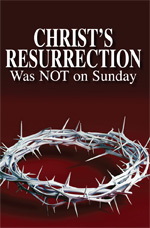In Matthew 5:29-30, Christ states, “And if your right eye offend you, pluck it out, and cast it from you: for it is profitable for you that one of your members should perish, and not that your whole body should be cast into hell. And if your right hand offend you, cut it off, and cast it from you: for it is profitable for you that one of your members should perish, and not that your whole body should be cast into hell.”
In Mark 9:43-48, Christ states, “And if your hand offend you, cut it off: it is better for you to enter into life maimed, than having two hands to go into hell, into the fire that never shall be quenched: Where their worm dies not, and the fire is not quenched. And if your foot offend you, cut it off: it is better for you to enter halt into life, than having two feet to be cast into hell, into the fire that never shall be quenched: Where their worm dies not, and the fire is not quenched. And if your eye offend you, pluck it out: it is better for you to enter into the kingdom of God with one eye, than having two eyes to be cast into hell fire: Where their worm dies not, and the fire is not quenched.”
It was not Christ’s intention for this instruction to be taken literally. Eyes, hands and feet cannot, of and by themselves, commit sin. Sin begins in a person’s mind (James 1:14). For example, a person who is totally blind, or one who is missing an arm or leg, can still sin.
Christ was merely using parts of the body to make an important point. He was showing that Christians should not tolerate sin as an integral part of their lives. If an individual has a sinful habit, he should overcome it, even though the process may be as painful as the loss of an arm or leg. Christ is saying that it is far better to forsake a sinful pleasure than to lose salvation. (Also read Colossians 3:5-17.)
Through these instructions, Christ was also teaching the principle of marking (taking note of; shunning; avoiding) members of the body (fellow Church members [Rom. 12:4; I Cor. 12:12-21]) who cause division, as the apostle Paul reiterated in Romans 16:17: “Now I beseech you, brethren, mark them which cause divisions and offenses contrary to the doctrine which you have learned; and avoid them.” We read in I Corinthians 5 of Paul’s instruction to disfellowship one who was committing fornication. He compared sin to leaven (vs. 6-7): “Your glorying is not good. Know you not that a little leaven leavens the whole lump? Purge out therefore the old leaven, that you may be a new lump…”
When these scriptures are considered together, in the proper context, the meaning of Christ’s statement becomes clear. The Church (Christ’s spiritual body) should not tolerate sin in its members, anymore than an individual should tolerate sin in his life.


















